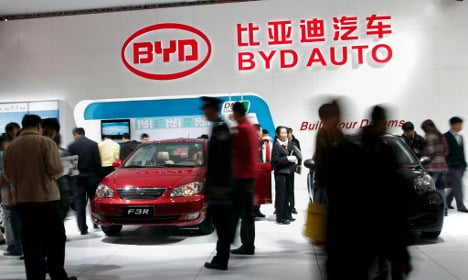Under the memorandum of understanding, the world’s oldest automaker and one of the youngest aim to market the vehicle under a new jointly owned brand, merging their technological knowhow for China’s fast expanding urban market.
“Under the agreement Daimler and BYD intend to develop a new electric vehicle especially for the requirements of the Chinese market,” said BYD general manager Henry Li in Geneva, calling it a milestone for the fledgling company.
“This is a cooperation between the most senior automaker and the youngest… between the country with the best auto industry and the country with the biggest auto market,” he told journalists.
Daimler chairman Dieter Zetsche said the company was taking a foothold in the electric vehicle sector in China, now the world’s biggest and fast growing car market with about 16 million sales a year.
“Daimler’s knowhow in electric vehicle architecture and BYD’s excellence in battery technology and e-drive systems are a perfect match,” Zetsche said in a statement.
In Geneva, Zetsche said he hoped for an agreement “pretty soon” and signalled that the two had an “ambitious schedule.”
“It’s certainly supposed to be an electric vehicle for the broader market,” he added.
Launched just seven years ago, BYD Auto now claims to be the sixth biggest car maker in China and its future plans are focused on electric or hybrid vehicles, building on the experience of its battery making parent group.
Li said the company’s sales grew about 150 percent last year.
The Chinese firm unveiled its electric powered E6 people carrier in Europe for the first time at the Geneva Motor Show, which opened its doors to industry watchers on Tuesday ahead of the public opening on Thursday.
It aims to sell the car in Europe in 2011.
Daimler, which made one of the first cars in the world in the 19th century, is the parent company of brands Mercedes and Smart.
The German carmaker recently started testing electric vehicle technology on the road in Berlin with a local power company, and also took a stake in US electric sports car specialist Tesla last May.
BYD and Daimler regard China as potentially being one of the world’s largest markets for zero emissions vehicles.
However, analysts are sceptical about the short term prospects for drivers, because of the current technical limits on the range of purely battery powered vehicles, their cost, and the lack of a networks of roadside power points.
“There will be serious numbers in 2020,” said Frank Schwope of Nord LB bank.



 Please whitelist us to continue reading.
Please whitelist us to continue reading.
Member comments